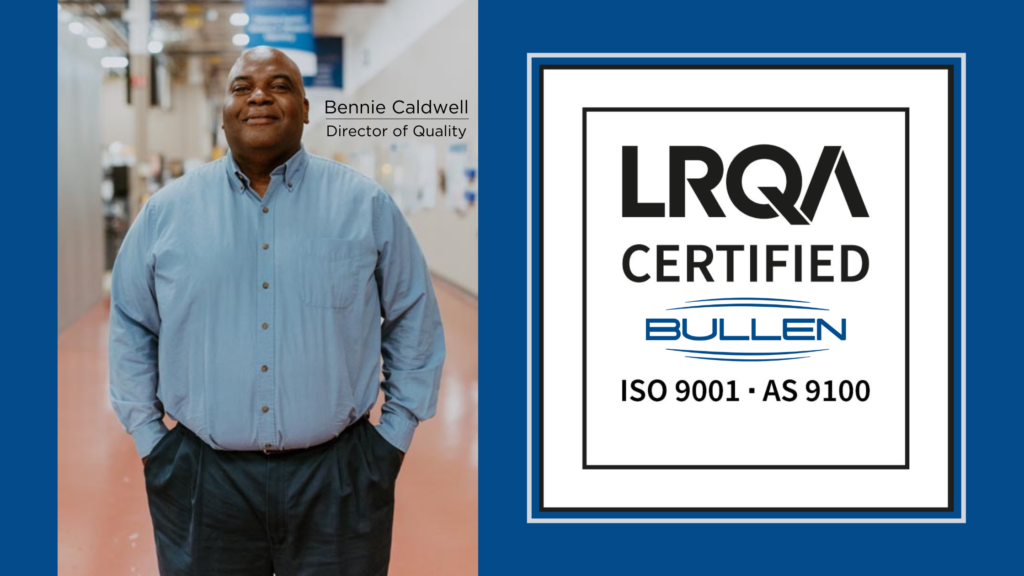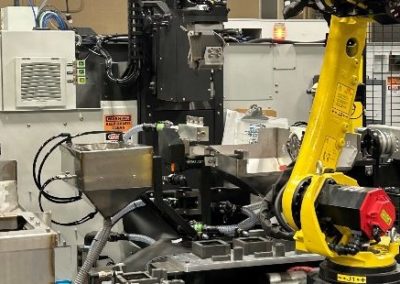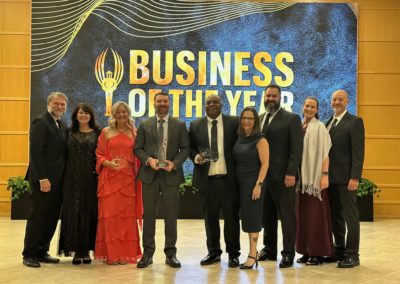A Guide to AS9100 Certification – From a Real, Certified Business

AS9100 is an international standard for companies working in the aerospace and defense industry that lays out requirements for Quality Management Systems (QMS). Organizations that are already (or looking to get) certified have a need to demonstrate their ability to provide products and services that meet customer and applicable statutory and regulatory requirements. They also look to enhance customer satisfaction through effective application of their system by focusing on key QMS principles such as leadership, engagement, and process improvement.
Maintaining an excellent QMS is essential in the aerospace and defense industry due to the high-stakes safety, regulatory, and reliability compliance required. It helps ensure that deadlines and budgetary requirements are met for customers, but also ensures the consistency and integrity of every step involved in creating and maintaining aircraft and spacecraft. By adhering to the principals of standards like AS9100 and ISO 9001, companies provide products and services that consistently meet their customers’ needs.
Our hope with this short guide to AS9100 certification is that businesses unfamiliar with the standards can become more familiar with them and appreciate the work and effort put forth to achieve and maintain certification.
History of AS9100 Certification
The AS9100 certification standard was first released in 1999 by the International Aerospace Quality Group (IAQG). Not to be confused with ISO9001, AS9100 standards builds off the generally applicable ISO9001 standards by adding clauses specific to the aerospace industry. At the time, it was recognized that there was a need for an aerospace-specific standard that was applicable to aviation, space, and defense sectors.
As industries have become more specialized, customers have also become more specialized. Due to that, updates have been made in 2001 (Rev A), 2004 (Rev B), 2009 (Rev C), and 2016 (Rev D – Current). Is it likely that more updates will be made to these standards and additional specialty QMS requirements for various industries (like AS9100 for aerospace) will be released as technology advances and customer needs continue to evolve.
Why is AS9100 Certification Needed?
Being AS9100 certified instantly tells customers that a business is dedicated to meeting the strict needs of the aerospace and defense industry. This also reduces the burden on the customer to conduct numerous supplier audits by showing the proof of the suppliers’ compliance to a universally recognized standard.
More opportunities arise within the supply chain as many businesses will want to partner with a business that is already certified. Plus, when certification is achieved, the recipient will be listed on the Online Aerospace Supplier Information System (OASIS) database, becoming more visible to any potential customers using that tool.
Internally, organizations working towards obtaining and maintaining certification will have improved process effectiveness and operational efficiency. It will help provide structure to common business activities like customer communication, training, and resource control. The enhancements gained through certification often translate into an improved customer reputation and higher customer satisfaction.
Key Components of AS9100 Certification
There are 7 core quality management principals surrounding AS9100 certification, that it shares with ISO 9001.
- Customer Focus: know your customers’ requirements and have a way to measure their satisfaction with your performance.
- Leadership Involvement: the more involved they are, the better the chance of success.
- Engagement of People: the more engaged and empowered the people in the business are, the more value they will bring to the organization.
- The Process Approach: evaluating your business as a system of processes that are connected stresses the importance of not treating each step as an individual silo.
- Improvement: businesses that focus on continual improvement find themselves in a better position to capitalize on opportunities as they arise.
- Evidence-Based Decision Making: basing decisions on the outcomes of data analysis and evaluation improves your likelihood of arriving at the desired result.
- Relationship Management: Any interaction between people can alter performance or output. Effectively managing and maintaining internal and external relationships is a key to prolonged success.
While there are shared principals between AS9100 and ISO9001, AS9100 is inclusive of all ISO 9001 requirements. ISO9001 is applicable to many industries whereas AS9100 includes concepts that are deemed essential to the aerospace and defense industries such as: Counterfeit parts, Critical Items, Key Characteristics, Product Safety, and Special Requirements.
How to get AS9100 Certified?
It helps to have a person or team in charge of quality that can help monitor practices on a continual basis. Businesses will have to become familiar with the most recently released standard and have the time to evaluate current operations to see how their current practices compare to what is outlined in the standard. The process for measuring your current QMS to the standard is called a “gap analysis”.
Issues identified during the gap analysis need to be documented and addressed before proceeding. A team should be assigned to investigate and correct the issues uncovered during the gap analysis. During the investigation, it is important to determine the true root cause of each issue. This will ensure that you address the issues at their core and eliminate reoccurrence in other areas. It’s also important to remember that compliance is not granted overnight. Becoming AS9100 certified is a huge undertaking, and businesses should not rush the process. It is not uncommon to experience setbacks in the form of confusion, resistance, and doubt as you embark on this journey. Enough time should be allotted for internal communication and training to eliminate these setbacks.
Throughout the process, companies should be creating and updating their documented information (Quality Manual, Procedures, Work Instructions, etc.). These documents form the backbone of the QMS and should be reviewed on a regular basis to ensure that they remain current. Implementing a formal internal audit program is a key factor in ensuring the long-term health of your QMS. Prior to engaging a certification body to start the external audit process, it is best to conduct multiple internal audits to ensure that your QMS is ready. Once you have achieved a high level of confidence in your QMS, you can proceed with the certification process.
Ongoing Compliance and Continuous Improvement
Maintaining ongoing compliance to the standard and continual improvement are key if you intend to get the most out of being certified. When first looking into process improvement activities, it’s important to weave AS9100 requirements into your processes at the earliest possible stages. Occasionally, even after you have been certified, updates to the standards will be released and your team may have to review them and implement changes to your processes to remain compliant.
There should be dedicated personnel that are part of your team who are in charge of ensuring your current practices remain compliant. This includes reviewing any continuous improvement activities and approving them in accordance with AS9100 requirements. Not having a system in place to review these activities, could result in findings during future audits conducted by the certification body.
_____________________________________________________________________________________________________________
Obtaining AS9100 is a significant achievement, but there is a lot of work involved with maintaining this certification. Every year, your company will be audited by a third-party certification body. Passing the annual audit should not be viewed as just a hurdle to get past. Having that mindset minimizes the benefits you gain from the certification. A better approach is to embrace AS9100 as a business tool. Think of it like healthy eating habits: A diet (a temporary set of restrictions surrounding the intake of food) is not effective in the long run unless a greater commitment is made to develop continual changes to your daily routine. Likewise, when AS9100 is executed properly, it will improve performance and help your bottom line in the present and as time goes on.
Bullen has been AS9100 certified with LRQA since 2016. This has allowed us to triple our revenue and diversify our business with increased access to aerospace companies since receiving this certification. It has also allowed us to improve our quality and our business processes which helped us improve our efficiency and profitability.
It’s our hope that other companies can better understand the significance of AS9100 certification, the process involved, and the benefits it brings to operations and the reputation in the aerospace industry.
Bennie Caldwell
Director of Quality, Bullen Ultrasonics
Need proof we’re committed? You can view proof of our certification here.



